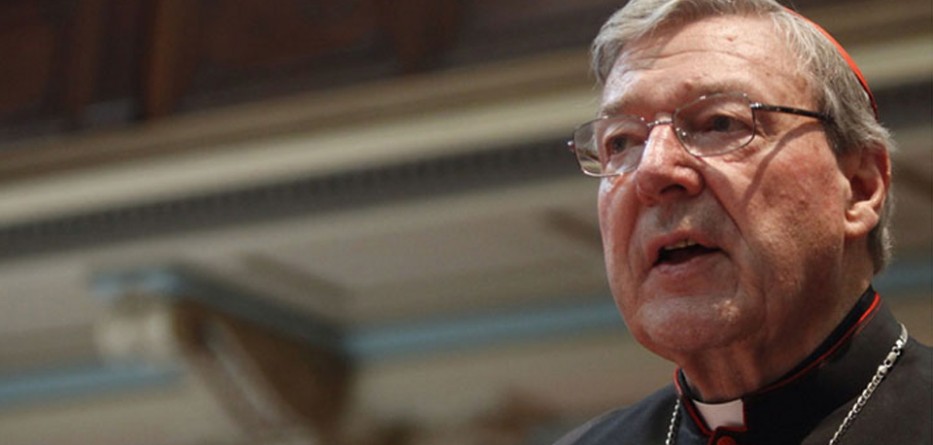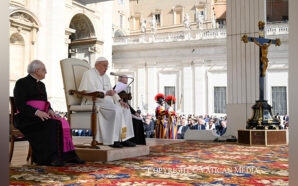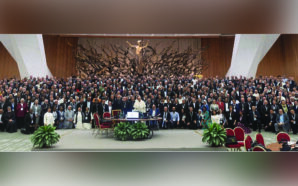Story first appeared at Crux, image courtesy of AP.
By John L. Allen Jr. Associate editor February 10, 2016
One could perhaps understand if Australian Cardinal George Pell, who was tapped by Pope Francis in 2014 as his point man for financial reform in the Vatican, was content these days to just sort of phone it in.
Pell turns 75 in June, the retirement age for Catholic bishops, and although cardinals often serve well beyond that threshold, the clock is ticking. His efforts to promote accountability have drawn resistance from the Vatican’s Italian old guard, and he’s facing an inquest from a Royal Commission in Australia about his handling of sex abuse cases decades ago.
Yet despite it all, Pell shows no signs of surrender.
Recently, the Vatican published a collection of papers presented to new Catholic bishops from around the world taking part in a Rome training course known informally as “baby bishops school.”
While several presentations were of dubious real-world value, not so with Pell’s. He was his usual no-nonsense self, wryly warning new bishops that “dishonesty is not unknown” in how Church personnel handle money.
Pell served as archbishop of Melbourne in Australia from 1996 to 2001, then as archbishop of Sydney from 2001 to 2014, and in both positions, sound financial management was one of Pell’s priorities. He also sat on a Council of Cardinals for the Study of Organizational and Economic Problems of the Holy See established under St. John Paul II, and was picked by Francis to be the Vatican’s first secretary for the economy.
In effect, what Pell gave the new bishops was a distillation of his life experience in trying to promote sound financial management according to accepted business standards. He included concepts that today seem no-brainers most places, but which, in the Catholic Church, still represent something of a revolution.
It’s telling, for instance, that Pell felt compelled to make the following point, which elsewhere would seem so basic as to be embarrassing to say out loud: “A diocese,” he said, “cannot continue to spend more than its income.”
At the big-picture level, Pell’s message can be expressed in terms of three points.
1. Don’t assume honesty
Part of the charm of the Catholic Church, but also arguably its Achilles’ heel, is that it assumes the good will and integrity of its personnel, especially clergy, until there’s in-your-face evidence to the contrary.
Pell’s pitch to new bishops on this front could be expressed in a single word: “Don’t.”
He told them a story about an experience with financial shenanigans he experienced when he was a newly ordained assistant in a parish. He insisted that every bishop must play a personal role in imposing internal controls, because if the perception is that the bishop isn’t paying attention, dishonest employees may feel the coast is clear.
“Bishops must understand financial basics and must take an interest in financial undertakings,” he said. “He cannot leave it to others; he cannot boast that he doesn’t understand this area.”
“This,” he said without mincing words, “would give encouragement to thieves.”
He also warned bishops to make the protection of diocesan resources a priority, because “there have been isolated cases where the patrimony of money and investments has been destroyed — sometimes by families, sometimes by reckless spending or reckless investments.”
2. Employ “four eyes”
Pell said every diocese needs a clear budgeting process, and departments shouldn’t automatically get what they want, but should have to defend requests — and if necessary, those requests should be “trimmed.”
He demanded that every diocese have an annual audit of all accounts by just one reputable firm. Having two or more firms run separate pieces of the audit, he said, “increases the possibility of hiding theft.” As part of the process, priests and parishes should be presented with an annual report so they know how diocesan money is being used.
The basic idea behind the “four eyes” approach is that no one person, including the bishop himself, should be the only one monitoring the use of diocesan resources. There must be checks and balances, ensuring integrity through the system.
Moreover, Pell said, such accountability is a basic requirement of many donors weighing whether or not to support the Church’s efforts in arenas such as charity and education.
3. Rely on lay expertise
Given that Catholic clergy aren’t really trained in finance, Pell advised new bishops to use appropriate lay expertise.
Among other things, Pell told the bishops that their finance committee, which is required by Church law, is “one of the most important bodies within the Curia in each diocese,” and insisted that bishops should always be present at its meetings.
“At least some of the consulters should be good businessmen,” he said.
The diocesan business manager should be an expert in finance and land, as well as civil and Church law. The finance committee should be a mix of priests and qualified laypeople.
A key figure is the diocesan business manager, who, Pell said, should not be simply an accountant, but also an entrepreneur who strives to protect and expand the assets available to the Church to do good works. He should also, Pell said, be a “pastorally oriented person.”
4. Other points
Beyond those basics, Pell tossed in some one-off insights.
For instance, he advised bishops never to sell land, a point that also applies to buildings — a step some bishops in the United States have taken, in part to fund settlements related to child sexual abuse litigation.
Longtime Pell adviser Danny Casey, who’s now working with him in Rome, put Pell’s attitude this way: “The Church will be here until the end of time … it’s never a good idea to sacrifice its patrimony for short-term gains.”
Instead, Casey said, one can find inventive ways of filling short-term gaps, such as arranging long-term leases on Church property without selling it outright.
Pell also counseled new bishops to launch a diocesan development fund to make loans to parishes for things like roof repairs. The parish will get a better interest rate, and the diocese will make marginal gains on both ends of the transaction.
Having laid out a vision of hands-on financial management, designed not merely to protect but to expand the Church’s resources, Pell also included a key caution.
“Wise usage [of money] is a Gospel duty,” he said, “but it is possible to become too interested in money-making.”
One might argue with Pell’s prescriptions, or the extent to which the new system he’s part of building in the Vatican actually reflects his own advice. (While there’s now a Council for the Economy responsible for overall policy that includes lay business experts, for instance, the Administration of the Patrimony of the Apostolic See, or APSA, still is overseen by cardinals).
What one can’t suggest, however, is that Pell has given up. Instead, he’s continuing his quest to drag the Church’s financial administration — if necessary, kicking and screaming — into the 21st century.








